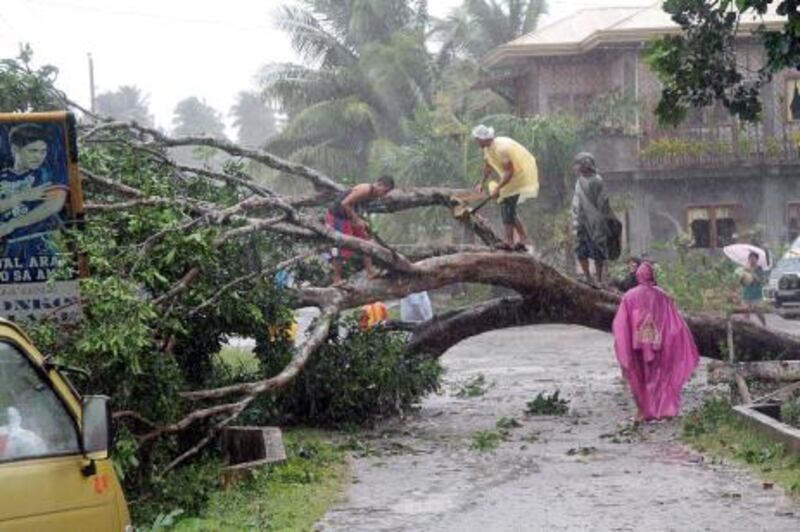ABU DHABI // Cornelio Nambatac is relieved that his family was prepared for yet another storm, but is still worried about their safety.
Typhoon Bopha, locally known as Pablo, packed gusts of up to 210kph and smashed into the southern Philippines yesterday, destroying homes, uprooting trees and power lines yesterday. It forced more than 40,000 people to evacuate into shelters.
At least 80 flights were grounded and more than 3,000 ferry passengers were stranded as the coast guard ordered vessels to stay in port, the civil defence office said.
"The strong winds toppled trees and ripped off roofs," said Mr Nambatac, 40, an Abu Dhabi government employee from Cagayan de Oro. "My family is OK but we're hoping it won't be a repeat of Sendong."
Residents in a riverside village in southern Cagayan de Oro that was wiped out last December by Typhoon Washi, locally known as Sendong, moved to a government hall, carrying TV sets and bundles of clothes.
Washi battered Cagayan de Oro and Iligan City in the early hours of December 17 last year, causing massive flooding that swept hundreds of homes and claimed the lives of more than 1,200. More than a million people were affected.
Mr Nambatac's three sisters, their husbands, four nieces and a nephew survived Washi's fury. They had to climb on to the roof of their two-storey home in the middle of the night as floodwaters entered their house. They did not have any electricity, water or food until late in the afternoon.
"They have since learned from that experience," he said. "They've stocked up on food and potable water, and moved all the electronic items to the second floor."
Yesterday, the commercial centre of Cagayan de Oro was hit by flooding as rivers overflowed following heavy rain.
Nolan Dalapo, 47, a library and research assistant at Abu Dhabi University, started monitoring news of the typhoon on Saturday. Last year, his siblings' homes in Cagayan de Oro were badly damaged in the floods, and they lost all their belongings.
"They all live near the river so I've asked them to temporarily move to our family home," Mr Dalapo said. "My former colleagues are not taking any chances and are staying at evacuation centres."
Schools were shut in Mindanao and across large areas of the central Philippines, with some of the schoolrooms serving as evacuation centres or to store relief supplies.
Bopha is the 16th typhoon in Philippine territory this year and the strongest yet. It made landfall at dawn yesterday in the southern province of Davao Oriental. It is expected to out of the country by Friday.
Jerry Villamor, 22, a salon worker in Abu Dhabi, called his mother in Davao City after watching the news on TV.
"Our house is located on higher ground but it's near the sea," he said. "I hope my family and the residents in the area are all safe."
* with additional reporting by The Associated Press and Agence France-Presse






